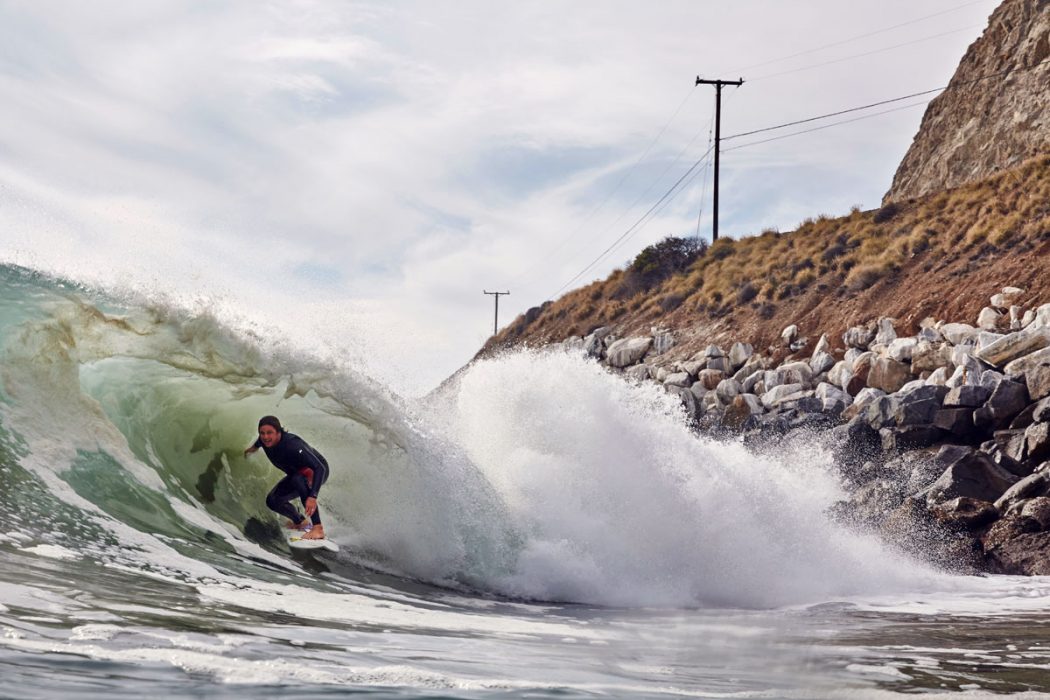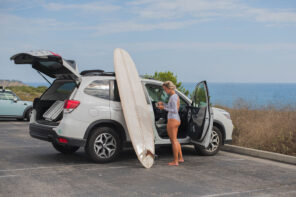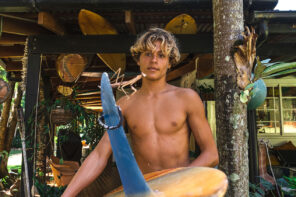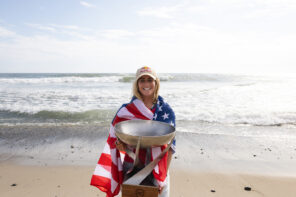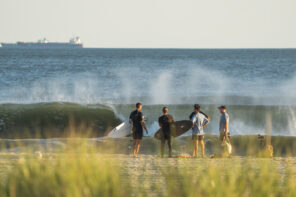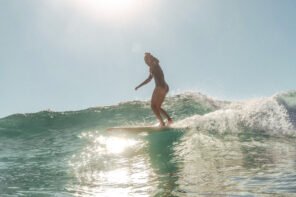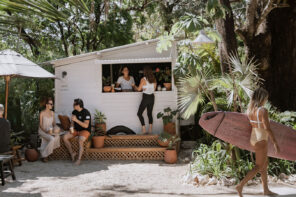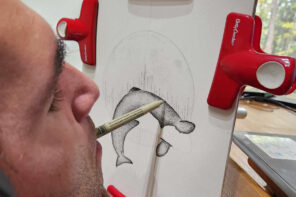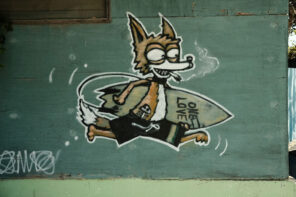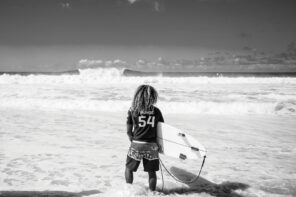We asked 30 people who we admire to each interview one person they admire. That’s the concept behind the Interview Issue presented by Design Within Reach.
Photographer and A Walk on Water president Steven Lippman chose pro surfer Reef McIntosh
 For more Reef and Lippman updates visit aultasurf.com
For more Reef and Lippman updates visit aultasurf.com
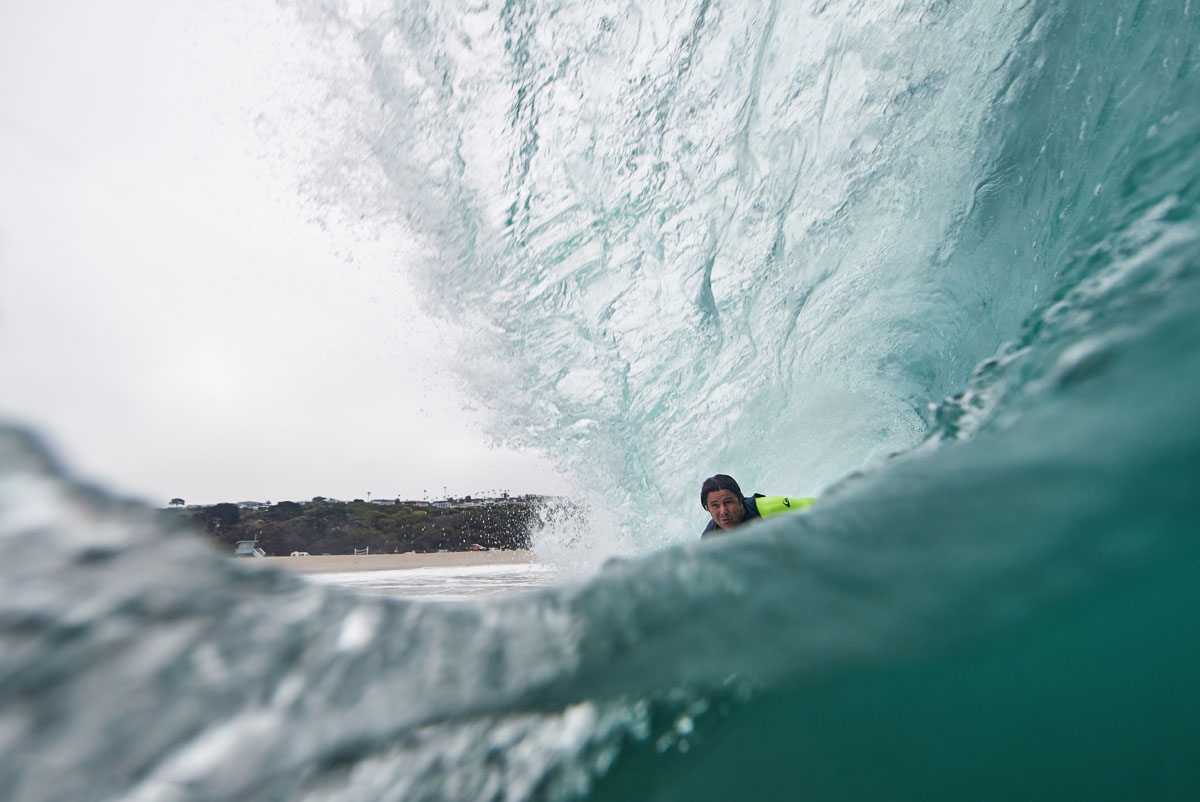
Reef photo by Steven Lippman
Steve Lippman: You’re often called, the blue-collar professional in action sports. You’re a hard-working guy, you come from humble beginnings, you got started as a dishwasher at Hanalei Wake Up Café. You’re one of the world’s most respected surfers, an individual with tons of character in and out of the water. How did you get your start?
Reef McIntosh: Damn, those are some flattering titles you just gave me. How did I get my start? I just kind of watched the people around me do their thing and turn into who they turned into, and I just took the little bit longer route to get to where I wanted to be. Maybe that just made me appreciate it more, or you know, cherish every moment more, don’t take anything for granted. I mean obviously, enjoy the moment, but it’s a job. It is a lifestyle, but it is a job at the end of the day. I just wanted to do my job to the best of my ability. Now here I am, 41 years old and still doing my thing.
SL: A lot of surfers sort of had a lot handed to them at an early age, and you had to jump into the trenches and start from the beginning—the scraps and not having that silver spoon in your mouth. Were you bitter at all, ever?
RM: Never, ever bitter. I was more motivated, I would say the word is, because I looked at people who were similar to me in talent, and they had it all. That was my motivation. They might have been a lot younger than me and I wouldn’t call it a silver spoon. I’d just say they had a little more support from their parents and that goes a long way when you’re 10, 11, 12, or 13 in the world of any sport, not just surfing. Who knew that certain people were becoming world champions and winning the title. You don’t know that when you’re that young and you’re just dicking around at school or at Pine Trees, but anything is possible, and obviously after it’s all said and done, my Dad always says, “I knew you were going to be that, I just, I couldn’t give it to you then. You had to go out and get it yourself.” Never bitter.
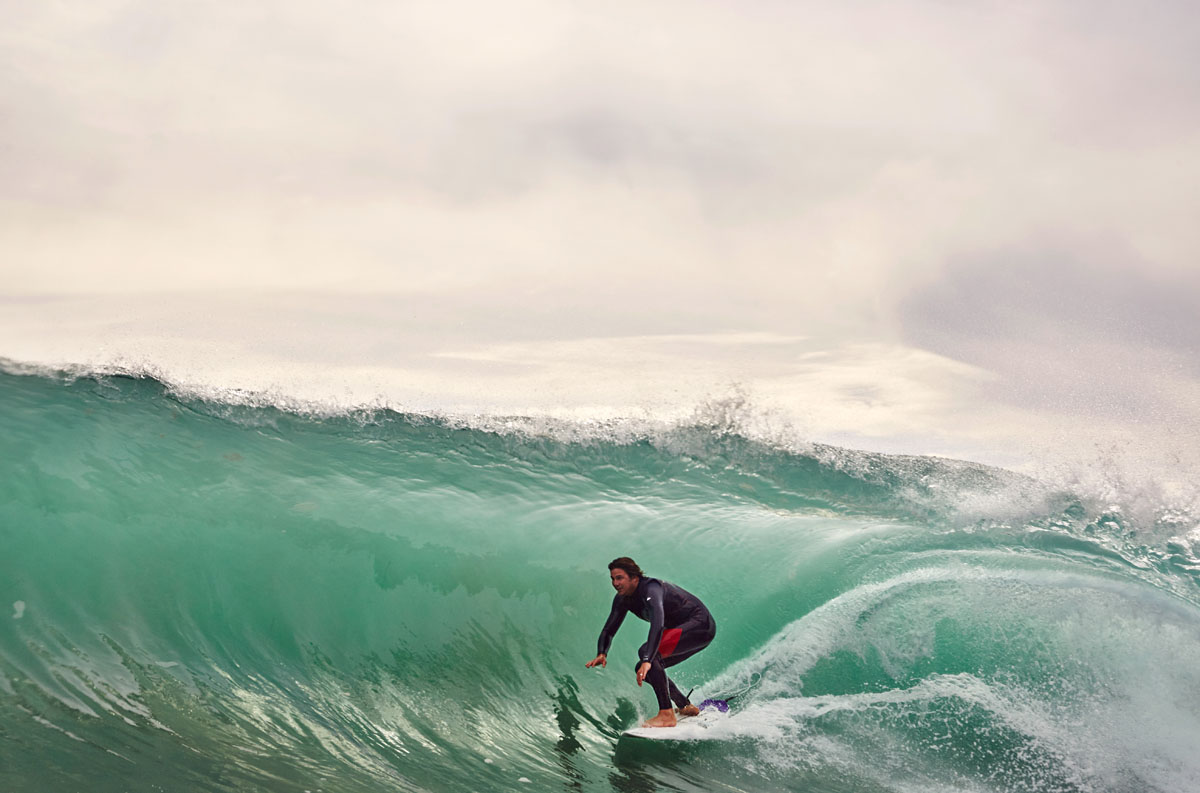
Reef photo by Steven Lippman
SL: You surround yourself with a lot of very talented people. You always seem to be in the right place at the right time when it comes to surfing. The people that surround you, how much of an influence do they have on you, and where life takes you?
RM: Influences were huge back then and they’re even bigger now. You can turn into a pro surfer nowadays if you’re an influencer—people want to hire you. But surrounding myself, I don’t know. My Dad taught me how to read a forecast, so that kind of helps me be in the right place at the right time, for swells and opportunities. And it’s similar in the water—you like to be around your core group of friends, so I think that shapes you in some ways for sure.
I mean obviously, enjoy the moment, but it’s a job. It is a lifestyle, but it is a job at the end of the day. I just wanted to do my job to the best of my ability.
SL: How do you feel about the world of social media, Instagram, and all the people that are becoming famous off of their Instagram pages?
RM: This is like the toughest question so far. They’re kind of, I don’t know, kind of corny. It’s just the day and age we live in. I guess it’s cool to share what you’re doing in your life to a certain extent. I don’t share all of it, not even half of it, but if that’s the way the game is going then, you know, you’ve got to go with the game.
SL: Adapting.
RM: Absolutely. Obviously, I do it, and it’s a part of what we do nowadays. Social media is a huge part. People become famous off of Instagram and obviously, they’re engaging a lot more than what some people do. If my whole thing came to an end tomorrow, I probably wouldn’t be on social media.
Follow @stevenlippman + @happyreef76
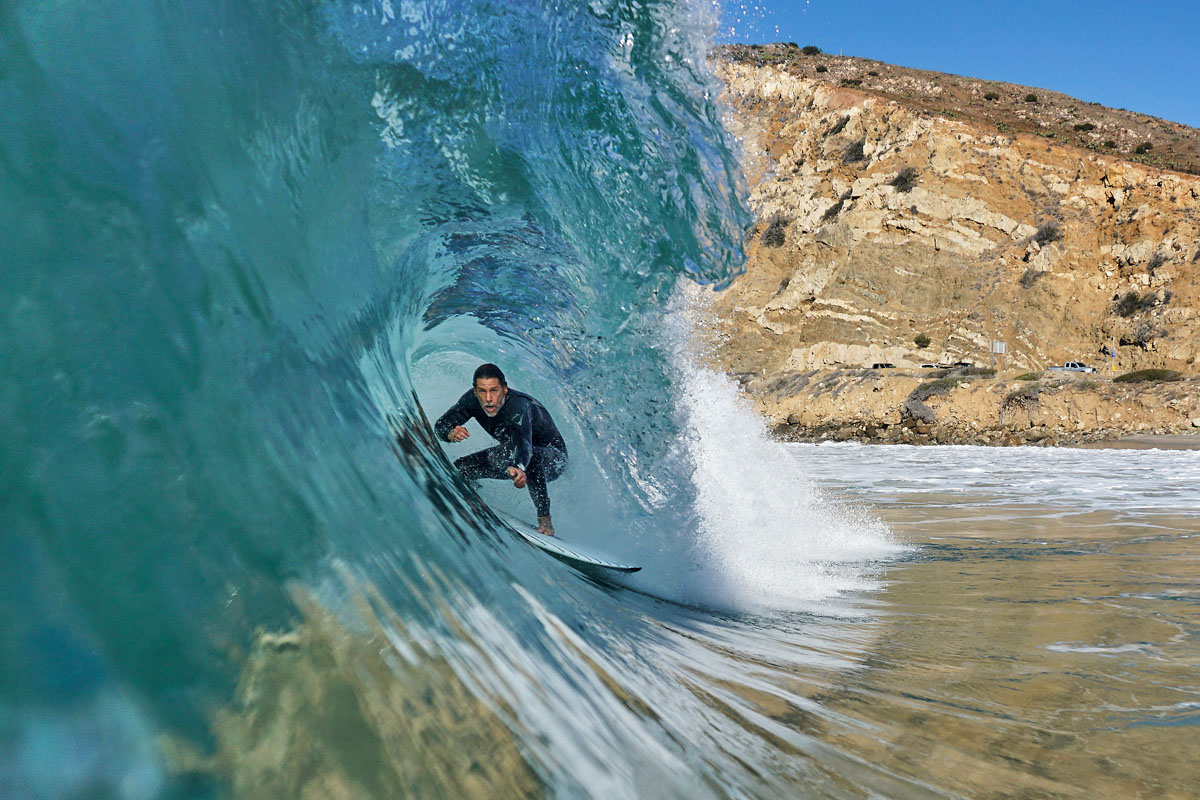
Surfer Steven Lippman, Yves Bright photo
Making Fried Chicken for Elvis
SL: It’s no secret that you know your way around the kitchen.
RM: OK, I mean I definitely enjoy a good meal. And when you wash dishes at a restaurant, you do learn. I mean, people think it’s so hard to make a good meal. It’s really not that hard, but when you start washing dishes and you see the other guy or the other woman back there cooking food, it’s kind of like a challenge when you work at a restaurant.
SL: Right.
RM: If you have all these orders stacking up, and you see the customers walking in, and you know it’s going to get busy, and you’ve got to get their food out on time, and make it taste good. It was kind of a fun challenge for a while. Now I just do it for pure enjoyment.
I worked at the Hanalei Café, because a guy got canned and they’re like, “Oh, you’re the new guy.”
SL: You’re self taught. You didn’t go to culinary school?
RM: No, I didn’t go to culinary school. I worked at the Hanalei Café, because a guy got canned and they’re like, “Oh, you’re the new guy.” I’m like, “What do you mean, I’m the new guy?” They’re like, “Yeah, you’ll learn fast. It’s just french fries and burgers and eggs and tacos.” Then, I had another friend of mine who did in-house catering, like high end kind of stuff, and I learned a lot from him too.
SL: Nice.
RM: It’s nice. I mean, like I said, I come from a working background, so I don’t mind spending 25 minutes to make a good dinner or a good lunch, or a good breakfast. It’s pure enjoyment now. I just don’t really like cleaning up.
SL: If you could have three people over for dinner, dead or alive, who would those three people be?
RM: Andy Irons, Elvis Presley and my grandma.
SL: That sounds like a pretty solid dinner. What would you make for dinner?
RM: I’d probably make chili pepper chicken because I knew Andy, he loved that one, and I think Elvis would like it, too, and my grandma. She likes fried chicken, yeah. Elvis, he was from the south, right?
SL: Absolutely.
RM: He’d like fried chicken, right? Yeah. I’d just have my little Hawaiian twist on it. I think he’d like it.
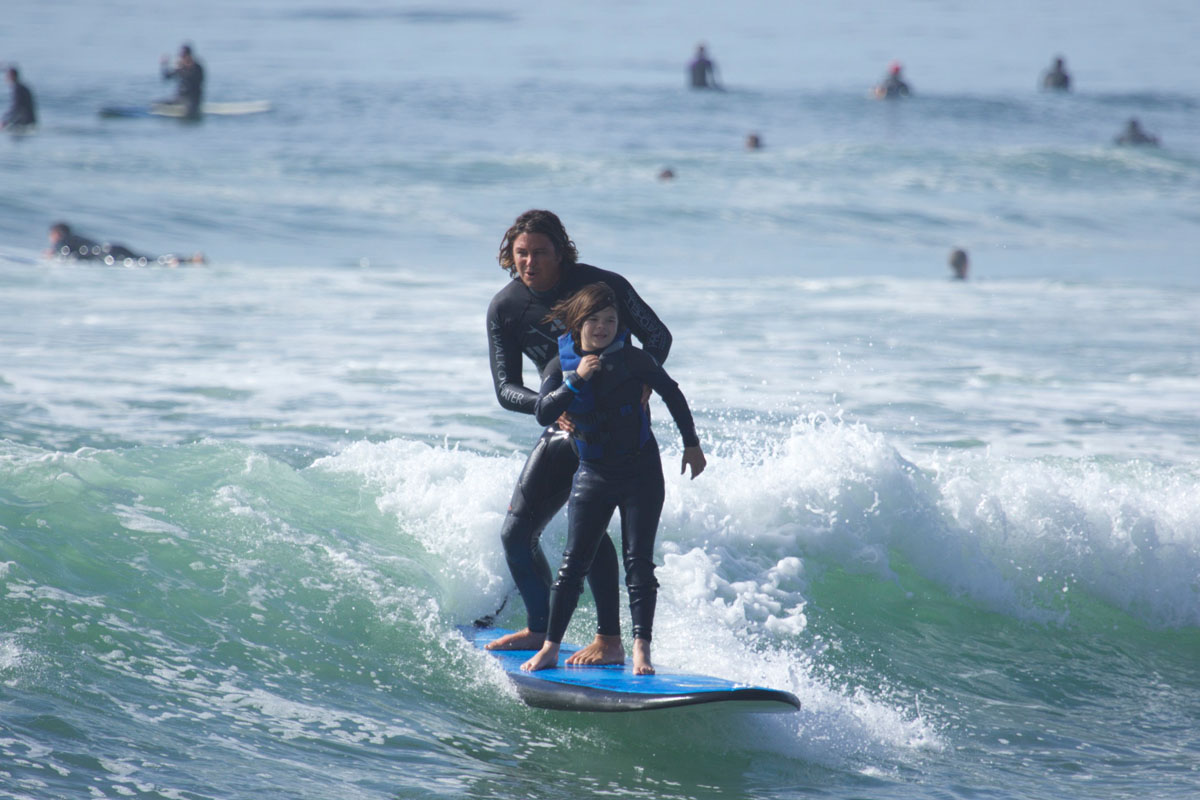
For Coconuts and Sardines
SL: You’ve been fortunate enough to be invited to The Eddie Contest many times. This year, there’s a possibility it might not run.
RM: I don’t know if you guys know this but they’re having the contest, just without Quicksilver.
SL: I just read that.
RM: I don’t know the details of who’s in it. I don’t know if they changed that part of the event. I’m not sure. Like I said, I was just actually looking on Surfline right now and saw that, and watched the interview that they put out. I guess they’re doing the ceremony, yeah.
SL: If you’re invited, who’s your crew and will you still surf it if there’s no prize money on the line?
RM: If I’m invited, I’ll 100% be out there. Like Clyde said his interview, for coconuts and sardines, we’ll just have a good time.
There’s so much energy down there at the bay when they call it on.
SL: Who’s the team that surrounds you?
RM: The people around me the other two times—pretty much my wife, Dad and Mom. Everyone is down there, but there’s so much energy going on down there, it’s crazy. It’s a hard one to describe, but there’s so much energy down there at the bay when they call it on. I kind of actually look for my wife and tell her, “Hey babe, I’m going to go get ready, and then I’ll give you a kiss before I walk down the beach and paddle out.” That’s about it. Everyone is down there doing their own thing, but yeah everyone has their own team, I keep it small.
SL: What is the thing that you like to do the most with your daughter?
RM: I’d say breakfast because Mom is still kind of asleep. My daughter gets up early and I’m already up, too, so we have our cereal and sit at her little table, and I have my coffee. I ask her what she dreamed about, it’s kind of always the same dream, but yeah, breakfast is it.
I want to say it’s indescribable because it isn’t describable.
SL: I’m going to ask you about your philanthropic passion. You’ve worked with non-profits, like Mauli Ola Foundation, Surfers Healing, and A Walk On Water. Since A Walk On Water is a connection, for me, I wanted to ask you what has your experience been like with A Walk On Water, and what it means for you to give back, and make that connection with families with special needs? How does that make you feel, and how does that project affect what you have in life? Does it make you appreciate it more?
RM: I mean you partially answered the question, but for me, when I get to do A Walk On Water, it compares to like catching the best wave of your life. But you were in the water with some amazing people, and you got them into maybe some of the best waves of their lives. Or just maybe just being in the ocean is an amazing thing for them. I want to say it’s indescribable because it isn’t describable. It’s like the best feeling you can get.
SL: Giving back to others?
RM: Yeah, you get that type of feeling when you have an amazing wave somewhere around the world, but you’re getting that feeling just by, like you said, giving back and enjoying those moments with those people. That’s why whenever anyone ever calls me to do something, I’m always like, “Yeah, no problem, I’ll be there, too easy.” I feel like I’m blessed. We’re all blessed, but some are blessed more, so I definitely raise my hand to show up and stay as long as possible.
SL: Speaking of the best wave on a trip or in your life, can you describe one wave that you’ve had in your lifetime that keeps coming back into your thought process? What is that wave? Where was that wave? And who did you share that moment with?
RM: It would have to be that wave in Fiji, during that Volcom event, when they called it off and it got really good, and the whole world was there—they kept broadcasting online. They shared it with the rest of the world and that wave kind of always comes back to me, just because it was so publicized. The whole process of getting to that swell from where we were, to where we finished that trip was head shaking. It kind of felt like a dream, but it was real. We were in Big Sur for a friend’s birthday, and we saw news about the swell and I actually wasn’t even going to go, but then I got the green light, so I went, and just kind of didn’t really expect what we got. Like I said, once it was all said and done I was like, “Wow, did that just happen? Did we just share those waves?”
It was cool, I mean everyone was there, so you almost shared it with everyone in the world… almost. Everyone was either there or everyone was watching. That one always comes back to me. That one, definitely that one.

